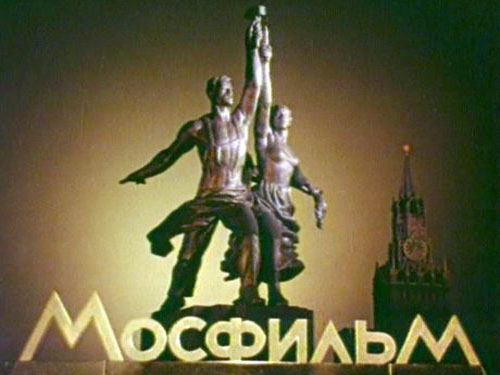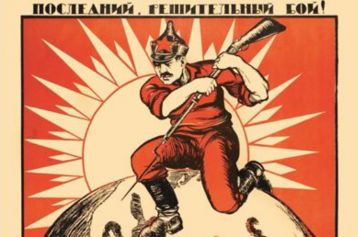How Mosfilm Milks Soviet Copyright Cows
In continuation of the post Kassandr , which perfectly covered the problem of blocking torrent hands of Soviet film classics on a rutor, and also examined the issue of providing pictures to the general public by Mosfilm, I decided to continue the topic, and dug a little deeper in law and economics to give the residents of Khabrovsk a more complete picture, why it happened, and why it is so important to make changes to the law in order to free the Soviet creative legacy from under copyright so that it can become a public domain.
For me, this is quite the expected result of "anti-piracy law." When we were scratching in the spring and summer that the law was needed in order to fight the pre-release pirated copies of blockbusters, which made it difficult to earn revenues in cinemas, it was obvious that this was utter nonsense, and either the authors of the law are not aware of what Either it is the result of a frank corporate lobby, or it is a completely logical course on tightening the regime screws. And of course, when such a mechanism is adopted, any economic entity will seek to protect property rights belonging to it by all means provided by the Law, and some do not even disdain to engage in copywriting racket in order to fill wallets from the sent items to site owners under the threat to block the resource. And such examples have come across in my practice more than once, when for miserable creative content, which in principle can not have at least some weighty cultural and economic value, the lawyers for the authors earn their money for this innovative legal racket. Of course, after the adoption of an absurd law, there will be an absurd practice.

')
WHAT HAPPENED?
The films “Moscow Doesn’t Believe in Tears”, “Caucasian Prisoner”, “Love and Doves” and “Ivan Vasilyevich” , masterpieces of Soviet cinema, got into the “copyright black list” with all the slag under the anti-piracy law. The success of these films can never be repeated by any modern high-budget blockbuster. However, how do you understand this move from Mosfilm?
For two days they called me from different channels with a request to comment on the situation. I replied to “Vesti” that this is another vivid example of the work of idiots who do not understand what the laws they are adopting lead to (of course, this did not go on the air). The definition of the Moscow City Court on November 28, 2013 is the fruit of the anti-popular No. 187-FZ and other provisions of the copyright laws.
Block Soviet cinema masterpieces from the pirates and make everyone go to the Mosfilm portal! This is a brilliant business idea Shakhnazarov how to defeat piracy on Soviet films on the network? Or is it another black PR of the new portal of FGUP mosfilm.ru? Giving instructions to his lawyers, could not Karen Georgievich sincerely believe that he would thereby defeat the unlicensed distribution of the films of Gaidai and Menshov on the Internet? It is quite obvious that with the adopted decision of MosGorStampa, no user who wants to download these films on the web will feel discomfort when searching for free copies of a film on the net. With uncomplicated search, I easily found the “Caucasian Captive” in 5 minutes on Rutreker , on Oumensharing , and on Vkontakte, as well as on Fasttorrent , Megashar, Rapidzone, Strimzone, and I am sure that they will be found on another hundred, or even a thousand other resources . It is easier to find video content-oriented sites on which these films are not.
So this statement, quite understandably, is a great PR campaign for Mosfilm to increase traffic to its online service. But this campaign made many people pay attention again with vigilance to the existing copyright laws of the Russian Federation.
It made me dig deeper and give a clear picture to everyone like “Mosfilm” received the films of the great Soviet director, and now he is squeezing the last juices out of them. Many naively believe that these films are part of the public domain inherited from the USSR, but this is not so. The Soviet heritage of culture is the darkest part of the last privatization, and since films and music of the Soviet period are viewed from the point of view of law as “intellectual property,” this property also has its specific owner.

Who took the rights to the Soviet film class?
In relation to the Mosfilm cinema fund, the owner is the successor in the person of the FSUE “Cinema Concern Mosfilm”, created in September 2002. Formally, the Federal Agency for State Property Management is the founder of Mosfilm.
Now copyright. The Civil Code of the RSFSR of 1964 (as amended in 1974) established that copyright was valid for the entire life of the author and 25 years after his death, starting from January 1 of the year following the year of death of the author. However, besides that, art. 498 of the Civil Code of the RSFSR established that the copyright of the organization was valid indefinitely. In the event of its reorganization, the copyright belonging to it shall pass to its assignee, and in the event of liquidation, to the state. In fact, this provision established an eternal copyright, just as it was in medieval England before the youngest daughter of King Henry adopted the first Copyright Statute in 1709, which for the first time limited the term of exclusive rights for a publisher.
This situation fits into the policy of the Soviet regime. The harmful effect of the perpetual copyright did not limit the public domain in a country where there was no private property, since everything was owned by the proletarians by default. But that all changed in a few decades. The collective property of the people has sunk into oblivion, a new country has emerged with new laws, and everything that was at least of some value was quickly divided between the successors.
In 1993, the Federal Law "On Copyright" was adopted. Then, in 2006, the new Civil Code was adopted, and in the Federal Law of the Russian Federation of December 18, 2006 No. 231- “On the introduction of the fourth part of the Civil Code of the Russian Federation”, backdating extended the period of protection of exclusive rights to the Soviet repertoire. Thus, with respect to almost all the cultural heritage of the Soviet past, it was established that, if the 50-year term of protection (the minimum term of protection established by the Bern Convention) did not expire by January 1, 1993, copyright shall be protected during 70 years since the death of the author (as established in the 4th part of the Civil Code of the Russian Federation).
And the copyright of legal entities, which arose before August 3, 1993, that is, before the entry into force of the Law of the Russian Federation of July 9, 1993 N5351-1 “On Copyright and Related Rights”, ceases after 70 years from the date of the lawful publication of the work, and if it was not made public, from the day the work was created.
This article of the Introductory Law to the Civil Code was the reason that films considered to be in the public domain of the Soviet period were suddenly backed up.

WHEN SOVIET FILM CLASSIC WILL BECOME A PUBLIC DOMAIN?
I turned to film screening to understand when the films of Gaidai and Menshov become public domain. And that's what happened:
Film - Premiere - Duration of exclusive rights to
"Moscow does not believe in tears" - 1980. - 2050
“Caucasian captive or new adventures of Shurik” - 1967 - 2037
“Love and doves” - 1985 - 2055
“Ivan Vasilyevich is changing his profession” - 1973 - 2043
Obviously, the situation could have been completely different, if in 2006, when the introductory law to the Civil Code was passed, it was established that the Soviet term for the protection of copyright to works created before 1993 is applied, it is the author’s entire life +25 years after his death (if copyrights belong to citizens), and for 25 years from the moment of publication of works (if copyrights belong to film studios). Then, under the regime of public domain, at least the film “Caucasian Captive” would fall. Well, other works could soon fall out from under the monopoly of copyright and become the true heritage of the people. Although even these terms would hardly have seemed fair to society, because all these films were created at the expense of Goskino money, which was directly funded from the state budget.

WHERE IS MONEY, ZIN ?!
What is the result? There is no Soviet Union, Gaidai died in 1993, the director doesn’t belong to the director, nor does he belong to any of the film composers and writers, and Mosfilm continues to milk the Soviet copyright cow. In this case, obviously, the current Mosfilm - this is not the Mosfilm, which once existed in the Soviet empire. Other people are sitting there, occasionally making another movie, and, to be honest, they are more involved in the rental and service business than in the independent production of films.
No public reporting by FSUE “Cinema Concern“ Mosfilm ”in open access to the network could be found, so we are not aware of the proceeds from the sale of digital copies of films and the provision of exclusive / non-exclusive licenses to third parties went to the budget of the Russian Federation, which is owned by Mosfilm ", Which means all films belonging to the cinema concern. We are also not aware of any deductions to the authors of films (directors, screenwriters and authors of music).
By the way, unitary enterprises are generally regarded as a less transparent form compared to joint-stock companies, since in the latter the law establishes corporate governance procedures. In relation to FSUE art. 27 of the Federal Law No. 161-FZ “On State and Municipal Unitary Enterprises” only regulates that “a unitary enterprise is obliged to publish reports on its activities in cases stipulated by federal laws or other regulatory legal acts of the Russian Federation”, however, neither on Mosfilm’s website, nor in any other sources to find the specified statements failed.
And the other day I happened to encounter live with the director of Mosfilm-Master LLC on the Moscow Region TV channel. We were invited there to discuss this issue. And so, according to the said figure, Karen Georgievich voluntarily pays part of the money from the proceeds to the authors' heirs. But again, no specific figures and recipients of fees are not named. Therefore, we can only guess what amounts we are talking about, and who gets them. And these payments, judging by the story of an employee of Mosfilm, have a purely voluntary beginning. And this means that if the kindness of Shakhnazarov’s spiritual kindness ends, or if a less good-natured boss replaces him in the chair, then payments will be kirdyk. The nature is voluntary and not obligatory, because the authors do not have happy exclusive rights holders in the light of the current legislation.
After the broadcast, I decided to check the affiliation of FSUE “Cinema Concern“ Mosfilm ”and LLC“ Mosfilm-masters ”, and here I came across such information from the Accounts Chamber:
I'd like to hope that living authors (well, or their heirs) really get at least something for their work. Then it could, at least, be an argument to explain why Mosfilm needed to block the torrent distribution on rutor.org. But if this is not, then this, forgive, elementary gossip, which can not be explained on my part. Without having any financial reports on the income of a state company for the exploitation of exclusive rights to Soviet films, I can only conclude that, despite the fact that the only owner is the Russian Federation, the beneficiary is actually Mr. Shakhnazarov and the company.

“A COW IS A STATE, AND EVERYTHING THAT IT GIVES IS MILK OR CALVES IS ALREADY OUR!”
So said in the famous cartoon Cat Matroskin. And, in fact, the way it happens. Of course, it’s silly not to milk a cow, since it gives milk, and the administration of the state farm gives you the exclusive right to milk this cow. So Mosfilm, guarding its cow, squeezes out all the juice from the immortal pictures, selling the rights to show and distribution, as well as monetizing movies on free viewing due to advertising on YouTube, as well as selling digital copies at prices ranging from 129 to 200 rubles. And this will continue until the cow of the Soviet copyright finally exhales.
It would be possible to at least somehow understand the policy of Mosfilm, if the films themselves were shown to anyone for free on YouTube, as they also sell them. Only it is not clear for whom? For those who do not know how to use VideoGrabber to download videos from Youtube or search on search engines and file sharing sites?
After this, my post, Mosfilm may accuse me of improperly providing information to ignorant users, how not to pay Mosfilm money and create a pirated copy of the product for myself using about YouTube service. But what to refer to this time? What piracy of Soviet films does not encourage the authors to further create new masterpieces?
So they had not been entitled to any payments before, and received pennies from general fees in the framework of voluntary state support of cultural figures.
I am convinced that any user, if he wishes, to watch films that are blocked up on a rut, will easily find them in the global network and without the Mosfilm portal.
Here is just an example of a neighbor can become contagious, and tomorrow, who knows, maybe MosGorStamp will receive a number of statements about interim measures to block a whole list of sites due to the fact that our “Internet” violated the exclusive rights of FSUE “Gosteleradiofond” and FSUE “ The United State Film Collection "for all films and cartoons released at the studios" Soyuzmultfilm "," Tsentrnauchfilm "," Lenfilm "," Diafilm "," The Central Film Studio for Children and Youth Films. Gorky and Sverdlovsk film studios.
Why? De facto, this is an obvious red-sightedness and hypocrisy, but de jure, the Film Fund has a complete legal right to this, and the Federal State Unitary Enterprise is recognized by the legislation to be exactly the same participant in civil law relations as other economic entities.
In the meantime, we are waiting for another claim to the founder of Pirate Bay, Gottfried Swarthholm, from Mosfilm, because it was established in previous decisions of MosGorStamp as the site administrator for rutor.org .
For me, this is quite the expected result of "anti-piracy law." When we were scratching in the spring and summer that the law was needed in order to fight the pre-release pirated copies of blockbusters, which made it difficult to earn revenues in cinemas, it was obvious that this was utter nonsense, and either the authors of the law are not aware of what Either it is the result of a frank corporate lobby, or it is a completely logical course on tightening the regime screws. And of course, when such a mechanism is adopted, any economic entity will seek to protect property rights belonging to it by all means provided by the Law, and some do not even disdain to engage in copywriting racket in order to fill wallets from the sent items to site owners under the threat to block the resource. And such examples have come across in my practice more than once, when for miserable creative content, which in principle can not have at least some weighty cultural and economic value, the lawyers for the authors earn their money for this innovative legal racket. Of course, after the adoption of an absurd law, there will be an absurd practice.

')
WHAT HAPPENED?
The films “Moscow Doesn’t Believe in Tears”, “Caucasian Prisoner”, “Love and Doves” and “Ivan Vasilyevich” , masterpieces of Soviet cinema, got into the “copyright black list” with all the slag under the anti-piracy law. The success of these films can never be repeated by any modern high-budget blockbuster. However, how do you understand this move from Mosfilm?
For two days they called me from different channels with a request to comment on the situation. I replied to “Vesti” that this is another vivid example of the work of idiots who do not understand what the laws they are adopting lead to (of course, this did not go on the air). The definition of the Moscow City Court on November 28, 2013 is the fruit of the anti-popular No. 187-FZ and other provisions of the copyright laws.
Block Soviet cinema masterpieces from the pirates and make everyone go to the Mosfilm portal! This is a brilliant business idea Shakhnazarov how to defeat piracy on Soviet films on the network? Or is it another black PR of the new portal of FGUP mosfilm.ru? Giving instructions to his lawyers, could not Karen Georgievich sincerely believe that he would thereby defeat the unlicensed distribution of the films of Gaidai and Menshov on the Internet? It is quite obvious that with the adopted decision of MosGorStampa, no user who wants to download these films on the web will feel discomfort when searching for free copies of a film on the net. With uncomplicated search, I easily found the “Caucasian Captive” in 5 minutes on Rutreker , on Oumensharing , and on Vkontakte, as well as on Fasttorrent , Megashar, Rapidzone, Strimzone, and I am sure that they will be found on another hundred, or even a thousand other resources . It is easier to find video content-oriented sites on which these films are not.
So this statement, quite understandably, is a great PR campaign for Mosfilm to increase traffic to its online service. But this campaign made many people pay attention again with vigilance to the existing copyright laws of the Russian Federation.
It made me dig deeper and give a clear picture to everyone like “Mosfilm” received the films of the great Soviet director, and now he is squeezing the last juices out of them. Many naively believe that these films are part of the public domain inherited from the USSR, but this is not so. The Soviet heritage of culture is the darkest part of the last privatization, and since films and music of the Soviet period are viewed from the point of view of law as “intellectual property,” this property also has its specific owner.

Who took the rights to the Soviet film class?
In relation to the Mosfilm cinema fund, the owner is the successor in the person of the FSUE “Cinema Concern Mosfilm”, created in September 2002. Formally, the Federal Agency for State Property Management is the founder of Mosfilm.
Now copyright. The Civil Code of the RSFSR of 1964 (as amended in 1974) established that copyright was valid for the entire life of the author and 25 years after his death, starting from January 1 of the year following the year of death of the author. However, besides that, art. 498 of the Civil Code of the RSFSR established that the copyright of the organization was valid indefinitely. In the event of its reorganization, the copyright belonging to it shall pass to its assignee, and in the event of liquidation, to the state. In fact, this provision established an eternal copyright, just as it was in medieval England before the youngest daughter of King Henry adopted the first Copyright Statute in 1709, which for the first time limited the term of exclusive rights for a publisher.
This situation fits into the policy of the Soviet regime. The harmful effect of the perpetual copyright did not limit the public domain in a country where there was no private property, since everything was owned by the proletarians by default. But that all changed in a few decades. The collective property of the people has sunk into oblivion, a new country has emerged with new laws, and everything that was at least of some value was quickly divided between the successors.
In 1993, the Federal Law "On Copyright" was adopted. Then, in 2006, the new Civil Code was adopted, and in the Federal Law of the Russian Federation of December 18, 2006 No. 231- “On the introduction of the fourth part of the Civil Code of the Russian Federation”, backdating extended the period of protection of exclusive rights to the Soviet repertoire. Thus, with respect to almost all the cultural heritage of the Soviet past, it was established that, if the 50-year term of protection (the minimum term of protection established by the Bern Convention) did not expire by January 1, 1993, copyright shall be protected during 70 years since the death of the author (as established in the 4th part of the Civil Code of the Russian Federation).
And the copyright of legal entities, which arose before August 3, 1993, that is, before the entry into force of the Law of the Russian Federation of July 9, 1993 N5351-1 “On Copyright and Related Rights”, ceases after 70 years from the date of the lawful publication of the work, and if it was not made public, from the day the work was created.
This article of the Introductory Law to the Civil Code was the reason that films considered to be in the public domain of the Soviet period were suddenly backed up.

WHEN SOVIET FILM CLASSIC WILL BECOME A PUBLIC DOMAIN?
I turned to film screening to understand when the films of Gaidai and Menshov become public domain. And that's what happened:
Film - Premiere - Duration of exclusive rights to
"Moscow does not believe in tears" - 1980. - 2050
“Caucasian captive or new adventures of Shurik” - 1967 - 2037
“Love and doves” - 1985 - 2055
“Ivan Vasilyevich is changing his profession” - 1973 - 2043
Obviously, the situation could have been completely different, if in 2006, when the introductory law to the Civil Code was passed, it was established that the Soviet term for the protection of copyright to works created before 1993 is applied, it is the author’s entire life +25 years after his death (if copyrights belong to citizens), and for 25 years from the moment of publication of works (if copyrights belong to film studios). Then, under the regime of public domain, at least the film “Caucasian Captive” would fall. Well, other works could soon fall out from under the monopoly of copyright and become the true heritage of the people. Although even these terms would hardly have seemed fair to society, because all these films were created at the expense of Goskino money, which was directly funded from the state budget.

WHERE IS MONEY, ZIN ?!
What is the result? There is no Soviet Union, Gaidai died in 1993, the director doesn’t belong to the director, nor does he belong to any of the film composers and writers, and Mosfilm continues to milk the Soviet copyright cow. In this case, obviously, the current Mosfilm - this is not the Mosfilm, which once existed in the Soviet empire. Other people are sitting there, occasionally making another movie, and, to be honest, they are more involved in the rental and service business than in the independent production of films.
No public reporting by FSUE “Cinema Concern“ Mosfilm ”in open access to the network could be found, so we are not aware of the proceeds from the sale of digital copies of films and the provision of exclusive / non-exclusive licenses to third parties went to the budget of the Russian Federation, which is owned by Mosfilm ", Which means all films belonging to the cinema concern. We are also not aware of any deductions to the authors of films (directors, screenwriters and authors of music).
By the way, unitary enterprises are generally regarded as a less transparent form compared to joint-stock companies, since in the latter the law establishes corporate governance procedures. In relation to FSUE art. 27 of the Federal Law No. 161-FZ “On State and Municipal Unitary Enterprises” only regulates that “a unitary enterprise is obliged to publish reports on its activities in cases stipulated by federal laws or other regulatory legal acts of the Russian Federation”, however, neither on Mosfilm’s website, nor in any other sources to find the specified statements failed.
And the other day I happened to encounter live with the director of Mosfilm-Master LLC on the Moscow Region TV channel. We were invited there to discuss this issue. And so, according to the said figure, Karen Georgievich voluntarily pays part of the money from the proceeds to the authors' heirs. But again, no specific figures and recipients of fees are not named. Therefore, we can only guess what amounts we are talking about, and who gets them. And these payments, judging by the story of an employee of Mosfilm, have a purely voluntary beginning. And this means that if the kindness of Shakhnazarov’s spiritual kindness ends, or if a less good-natured boss replaces him in the chair, then payments will be kirdyk. The nature is voluntary and not obligatory, because the authors do not have happy exclusive rights holders in the light of the current legislation.
After the broadcast, I decided to check the affiliation of FSUE “Cinema Concern“ Mosfilm ”and LLC“ Mosfilm-masters ”, and here I came across such information from the Accounts Chamber:
“It was also noted at the Board that with the participation of Mosfilm management, a commercial organization Mosfilm Master was created, the participation of Mosfilm in the authorized capital of which was not reflected in its accounting records. Services for the company's main activities are provided at the production base of Mosfilm, which ensures the company's break-even operations and profit, which is subsequently distributed among the management staff of Mosfilm as members of the company.
The board decided to send submissions to the Ministry of Culture and the Cinema Foundation, information letters to the Government of the Russian Federation, the Federal Tax Service of Russia and the Board of Trustees of the Cinema Foundation, as well as an appeal to the Prosecutor’s Office of Russia (regarding the Mosfilm cinema concern). The report on the results of the control measure is sent to the chambers of the Federal Assembly. ”
I'd like to hope that living authors (well, or their heirs) really get at least something for their work. Then it could, at least, be an argument to explain why Mosfilm needed to block the torrent distribution on rutor.org. But if this is not, then this, forgive, elementary gossip, which can not be explained on my part. Without having any financial reports on the income of a state company for the exploitation of exclusive rights to Soviet films, I can only conclude that, despite the fact that the only owner is the Russian Federation, the beneficiary is actually Mr. Shakhnazarov and the company.

“A COW IS A STATE, AND EVERYTHING THAT IT GIVES IS MILK OR CALVES IS ALREADY OUR!”
So said in the famous cartoon Cat Matroskin. And, in fact, the way it happens. Of course, it’s silly not to milk a cow, since it gives milk, and the administration of the state farm gives you the exclusive right to milk this cow. So Mosfilm, guarding its cow, squeezes out all the juice from the immortal pictures, selling the rights to show and distribution, as well as monetizing movies on free viewing due to advertising on YouTube, as well as selling digital copies at prices ranging from 129 to 200 rubles. And this will continue until the cow of the Soviet copyright finally exhales.
It would be possible to at least somehow understand the policy of Mosfilm, if the films themselves were shown to anyone for free on YouTube, as they also sell them. Only it is not clear for whom? For those who do not know how to use VideoGrabber to download videos from Youtube or search on search engines and file sharing sites?
After this, my post, Mosfilm may accuse me of improperly providing information to ignorant users, how not to pay Mosfilm money and create a pirated copy of the product for myself using about YouTube service. But what to refer to this time? What piracy of Soviet films does not encourage the authors to further create new masterpieces?
So they had not been entitled to any payments before, and received pennies from general fees in the framework of voluntary state support of cultural figures.
I am convinced that any user, if he wishes, to watch films that are blocked up on a rut, will easily find them in the global network and without the Mosfilm portal.
Here is just an example of a neighbor can become contagious, and tomorrow, who knows, maybe MosGorStamp will receive a number of statements about interim measures to block a whole list of sites due to the fact that our “Internet” violated the exclusive rights of FSUE “Gosteleradiofond” and FSUE “ The United State Film Collection "for all films and cartoons released at the studios" Soyuzmultfilm "," Tsentrnauchfilm "," Lenfilm "," Diafilm "," The Central Film Studio for Children and Youth Films. Gorky and Sverdlovsk film studios.
Why? De facto, this is an obvious red-sightedness and hypocrisy, but de jure, the Film Fund has a complete legal right to this, and the Federal State Unitary Enterprise is recognized by the legislation to be exactly the same participant in civil law relations as other economic entities.
In the meantime, we are waiting for another claim to the founder of Pirate Bay, Gottfried Swarthholm, from Mosfilm, because it was established in previous decisions of MosGorStamp as the site administrator for rutor.org .
Source: https://habr.com/ru/post/205746/
All Articles